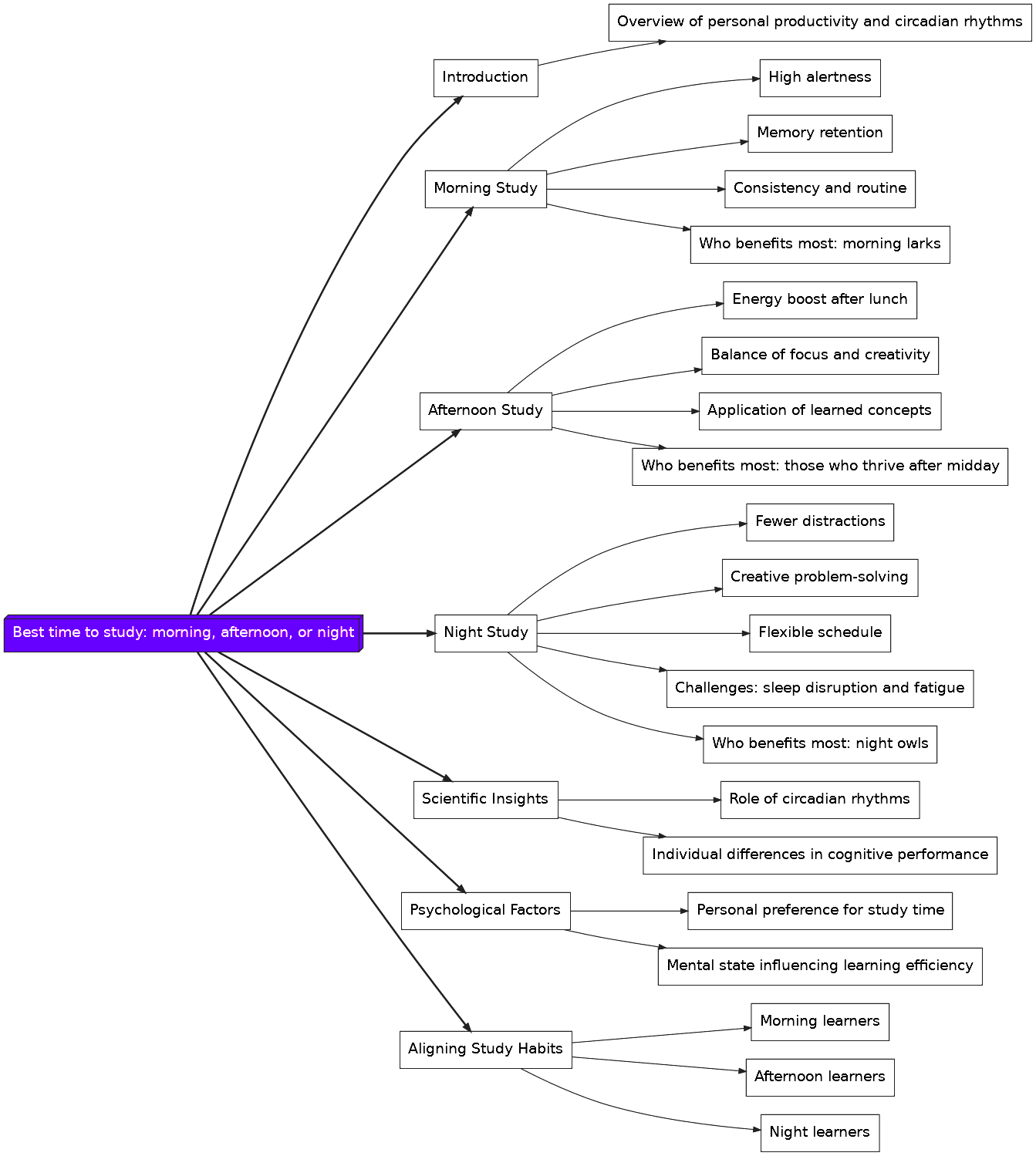
Best Time to Study: Morning, Afternoon, or Night?
Introduction
When is the best time to study—morning, afternoon, or night? This age-old question has sparked debates among students and professionals alike. Understanding the most effective study time isn’t just about convenience; it’s about aligning with your body's natural rhythm for better focus, retention, and productivity. Whether you’re a morning lark, an afternoon enthusiast, or a night owl, research shows that your cognitive performance and memory retention can vary significantly depending on the time of day.
In this article, we’ll explore the best study times based on scientific research on productivity, cognitive performance, and memory retention. We’ll also dive into personal preferences, circadian rhythms, and how you can customize your study habits to maximize learning efficiency.

Morning Study Sessions: A Fresh Start
Morning study sessions can be highly beneficial for tasks requiring deep concentration and logical thinking. Research suggests that the brain is more alert in the early hours of the day, making it the optimal time for tasks like problem-solving, analytical thinking, and subjects that demand intense focus.
Benefits of Morning Study
- High Alertness: The brain is typically at its most alert in the morning, especially after a good night’s sleep. This means better focus, attention to detail, and higher levels of productivity.
- Memory Retention: Several studies highlight that studying in the morning can improve memory retention. This is because the brain is more active and receptive after a period of rest, allowing for better absorption of new information.
- Consistency and Routine: Early risers, or "morning larks," often develop a consistent study routine, which helps in building strong study habits over time. Routine reinforces focus and creates a structured learning environment.
Who Benefits Most?
Students who thrive in structured environments may find morning study sessions more productive. Those who can wake up early and remain disciplined throughout the day can maximize their cognitive performance during these hours.
Afternoon Study Sessions: Midday Focus and Productivity
The afternoon offers a unique blend of mental clarity and physical energy, making it an ideal time for application-based tasks or collaborative learning activities. While it may not be as quiet as the morning or night, some individuals find that their cognitive performance peaks in the afternoon.
Benefits of Afternoon Study
- Energy Boost: After lunch, the body’s energy levels often peak, offering a window of opportunity for focused study. This can be an excellent time for students who find it difficult to concentrate in the morning.
- Balance of Focus and Creativity: The afternoon is a time when both focus and creativity can be balanced. For those who enjoy working on projects, group work, or practical tasks, the afternoon might offer the best cognitive flexibility.
- Retention and Application: While the morning is great for learning new concepts, the afternoon may be better suited for applying what you've learned. It's an optimal time for revision, practice exercises, or group discussions that require both focus and energy.
Who Benefits Most?
Individuals who experience midday focus boosts and feel sluggish in the early morning may find this time more effective for studying. This time slot works well for those who perform better with breaks throughout the day and need a break between morning classes or work hours.
Night Study Sessions: Quiet Hours for Deep Focus
Night owls, rejoice! For many students, late-night study sessions provide the peace and quiet necessary for deep concentration and creative thinking. However, this comes with its own set of challenges.
Benefits of Night Study
- Fewer Distractions: At night, the world tends to quiet down, offering fewer interruptions. This can be particularly useful for tasks that require intense focus and creative thinking.
- Creative Problem-Solving: Night owls often find that they can enter a state of “flow” more easily during the late hours. This mental state is perfect for tackling complex problems or generating creative ideas.
- Flexible Schedules: For individuals who have packed schedules during the day, night study sessions offer the flexibility to catch up on learning without the pressure of the day’s demands.
Challenges of Night Study
- Sleep Disruption: Late-night study sessions can interfere with sleep patterns. Consistent late-night studying may lead to poor sleep, which negatively impacts memory consolidation and cognitive performance.
- Fatigue: While some may thrive at night, others may struggle with fatigue after a long day of work or classes. This can lead to diminished focus and retention over time.
Who Benefits Most?
Students who naturally stay up late and feel more energized during the night may benefit from night study sessions. However, it’s important to balance night-time study habits with adequate rest to ensure long-term productivity.
Scientific Insights: The Role of Circadian Rhythms
Circadian rhythms—your body’s internal clock—play a significant role in determining your productivity and cognitive performance at different times of the day. These rhythms affect how your body responds to physical and mental tasks, influencing your alertness, focus, and energy levels.
Research shows that circadian rhythms differ from person to person. Early risers may perform better in the morning, while night owls may find their peak productivity in the late hours. Understanding your own circadian rhythm can help you tailor your study schedule to times when you are naturally more alert and focused.
Psychological Factors and Study Preferences
Beyond biological factors, psychological preferences also play a role in determining the best time to study. Some students feel more motivated in the morning after a fresh start, while others feel a sense of accomplishment when they study late at night, knowing they’ve tackled the day's tasks.
Additionally, your mental state during different times of the day can affect how well you absorb and retain information. For example, if you feel stressed in the morning, it may be harder to focus, while a relaxed afternoon may allow for better learning.
Aligning Study Habits with Personal Productivity Cycles
Customizing your study habits based on your personal productivity cycles can lead to more effective learning outcomes. Here’s how you can align your study schedule with your natural rhythms:
- Morning Learners: Focus on challenging subjects like math, science, or analytical tasks. Keep study sessions short but intense, and ensure you start with a fresh mind.
- Afternoon Learners: Use this time for group projects, discussions, or hands-on learning. If you feel sluggish after lunch, opt for a short walk or light physical activity to regain energy.
- Night Learners: Dedicate this time to creative tasks or reviewing complex concepts. Limit distractions by studying in a quiet, peaceful environment, and ensure you maintain a healthy sleep routine.
Conclusion
There is no one-size-fits-all answer to the question of the best time to study. Your optimal study time depends on your personal circadian rhythm, psychological preferences, and daily schedule. By understanding how your body and mind perform at different times of the day, you can create a study routine that enhances focus, productivity, and memory retention.
Whether you’re an early bird, an afternoon learner, or a night owl, the key is to listen to your body and align your study habits with your natural rhythm. Experiment with different study times, track your performance, and adjust accordingly to maximize your learning efficiency.
Study Tips Students




